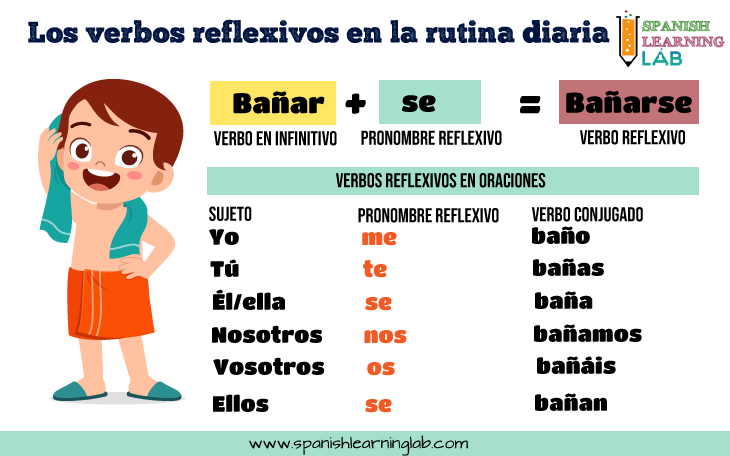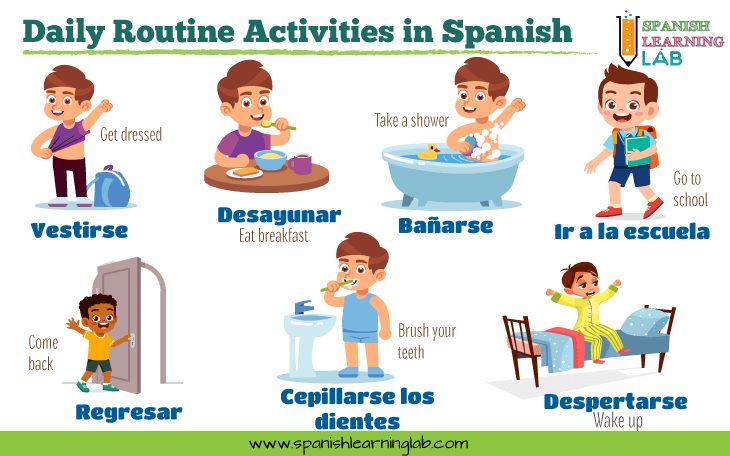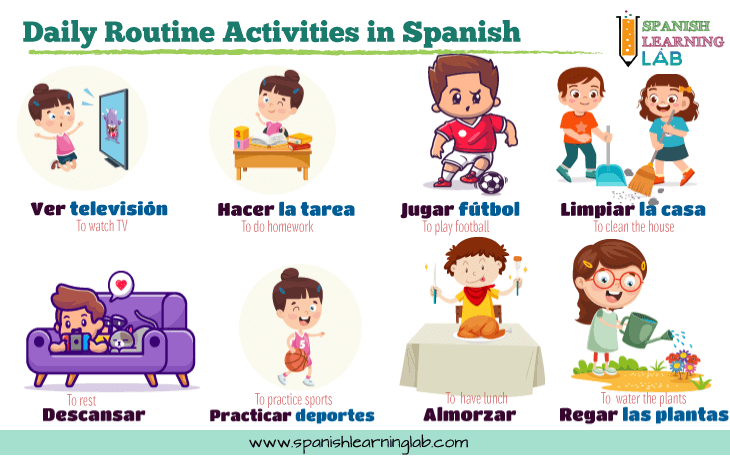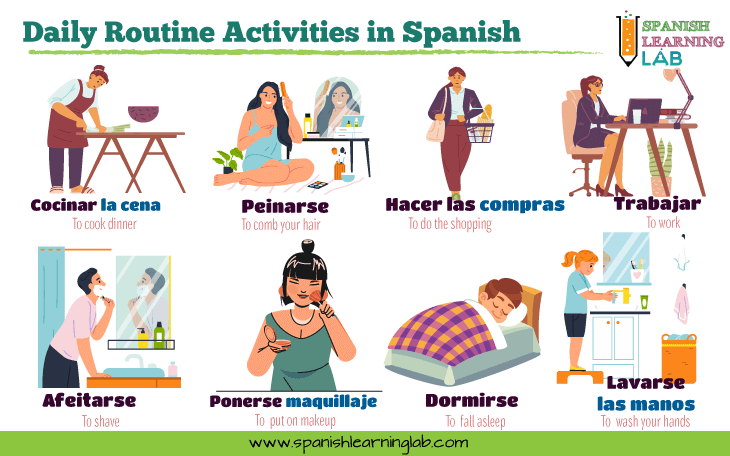¿Qué haces todos los días? ¿Cuál es tu rutina diaria? These are two common questions to ask about someone’s daily routine in Spanish – la rutina diaria. In a previous lesson, we covered the most important words for everyday activities and made sentences with reflexive and non-reflexive verbs. This lesson will go a little further and teach you how to use the right vocabulary, phrases and structures to describe what you do daily to your friends or class. By the end of the lesson, we expect you to be able to write sentences and short descriptions about your daily routine in Spanish.
Vocabulary review: Daily routine and reflexive verbs in Spanish
First, we will review the vocabulary for daily activities. All the activities used to describe daily routines in Spanish are represented by verbs. This video explains how to conjugate reflexive verbs and use them to make sentences about everyday activities, as well as how to ask what someone does every day and more. The final part of the video shows a short passage describing someone’s daily routine in Spanish for a typical day. The video is easy to follow and also includes many important things that you will not find in the rest of the lesson. Please activate the captions (cc) if you need them.
Describing daily routines in Spanish: examples and common verbs
Spanish reflexive verbs in daily routines
Most activities in daily routines are verbs in infinitive like JUGAR (to play) or COMER (to eat), and sometimes Spanish reflexive verbs such as DESPERTARSE (wake up) and VESTIRSE (get dressed). In order to conjugate reflexive verbs, you have to conjugate the first part of the verb following the rules for regular or irregular verbs, and add a reflexive pronoun that agrees with the subject in the sentence. Too much, we know! That is why Spanish reflexive verbs are covered with a lot more details in an independent lesson. That being said, DESPERTARSE will change to “(Yo) Me despierto”, “(Tú) Te despiertas”, “(Él/Ella/Usted)Se despierta”.

The first example of a daily routine will show someone talking about his morning routine in Spanish, “la rutina de la mañana“. Sequence words like “Primero” (first), “Luego” (then), “Antes de” (before), “Después de” (after) and “Finalmente”(finally) will be used in most descriptions to connect ideas. This will make the descriptions more real and complete. Pay attention to the way the vocabulary for daily routines in the box is used to make meaningful sentences and a complete paragraph.
My daily routine in Spanish
Example No. 1: Mi rutina de la mañana en español (with some reflexive verbs)

Mi nombre es Ben. Yo me despierto a las seis de la mañana. Primero, me levanto y luego me baño por 10 minutos. Antes de desayunar yo me cepillo los dientes y me visto. Después yo desayuno con mis hermanos y mis padres. Finalmente me voy a la escuela y regreso a mi casa al medio día.
Non-reflexive verbs in daily routines
In the previous example, the guy was talking about his own routine so he used sentences with the structure “Yo me + verb + complement”. As you can see in that example, verbs like DESAYUNAR and REGRESAR do not need the reflexive pronoun ME because both of them are non-reflexive verbs in Spanish. For the verb IR, both “Yo me voy…” and “Yo voy…” are possible.
Here is a second example, but this time including some words for hobbies and likes (ME GUSTA + activity), as well as frequency adverbs such as “Siempre” (always), “De vez en cuando” (sometimes) and “A veces” (sometimes), besides non-reflexive verbs in the same paragraph about a daily routine in Spanish.
Example No. 2: My daily routine (including non-reflexive verbs)

Yo hago muchas actividades todos los días. Voy a la escuela en la mañana. Después de regresar almuerzo y descanso por una hora. Luego hago mis tareas y estudio para el día siguiente. Me gusta ver televisión y jugar videojuegos. También me gusta practicar deportes como fútbol y béisbol de vez en cuando. Siempre ayudo a limpiar la casa, lavar los trastes y hacer los quehaceres en la casa. A veces voy al cine con mis amigos o jugamos juntos.
Describing other people’s routine in Spanish
To talk about the activities that other people do on a daily basis, we will use reflexive pronouns that actually refer to other people, not only “ME”, for example: “Ella se baña” (she takes a shower), “Tú te vistes” (You get dressed) and so on.
You can even say if a person has an interesting (interesante), simple (sencilla) or busy (ocupada) routine. Besides, you can combine sentences about your daily routine in Spanish with activities that other people do, e.g. “Yo me levanto temprano y él se levanta tarde” (I get up early and he gets up late). Normally, all you need to know is which verbs will behave in a reflexive way and which will not. It all comes to practice and seeing examples, so here is one more daily routine description for you to learn a few more things.
Example No. 3: My family’s daily activities in Spanish

Nuestra rutina diaria en español
Yo hago muchas actividades todos los días. Tengo dos hijos, un niño y una niña. Me levanto a las 6 de la mañana, cocino el desayuno para nosotros y les ayudo a mis hijos a alistarse para ir a la escuela. Marcos se baña y se viste solo. Rosa hace muchas cosas por sí misma. Yo voy a mi trabajo a las 8 de la mañana. Cuando regreso hacemos los quehaceres juntos y cenamos. Los niños se duermen a las 10 de la noche. En general, es una rutina muy ocupada.
¡Practice this vocabulary online!
Pay attention to the illustrations on these interactive vocabulary flashcards, and write the name of each daily routine activity in Spanish below them.
Listening Activity No. 1: My daily routine in Spanish – Mi rutina diaria
Listening Activity No. 2: What’s your routine like? – ¿Cómo es tu rutina?
Extra practice: Finding the right order for a daily routine
Practice and Writing: A short essay about your daily routine in Spanish
Write a short essay talking about your daily routine. You can simply write three paragraphs, one talking about your morning routine in Spanish, another about the activities you do in the afternoon and so on. If possible, share it with a native speaker and ask him about his as well.
Related PDF Worksheets:
- Telling Time in Spanish – PDF Worksheet
- Daily Activities in Spanish (Label activities)
- Daily Routine Activities in Spanish (Vocabulary)
- Verbs for Daily Routines in Spanish – Crossword Puzzle
- Reflexive Verbs in Spanish – PDF Word Search
- Conjugating Reflexive Verbs in Spanish (Chart + Sentences)
- My Daily Routine in Spanish – (Reading)
- Daily Activities & Time in Spanish (Clocks + activities)
- Household Chores in Spanish – PDF Worksheet
- Dialogues about daily routines in Spanish
- Messi’s Daily Routine in Spanish (Reading + exercises)
- Daily Activities and Time in Spanish (Timetable + Sentences)

I really enjoyed the different excercises and fun & games to help me to comprehend my Spanish work. They really helped me!
Hola,
Thanks for your comment. We are happy to hear this lesson helped you. La idea es ayudar un poquito…
Muchas gracias! Excelente trabajo!
Muchas gracias 🙂
The lessons are good. However I find the music background very distracting. Much harder to concentrate.
Thanks! We’ll keep it in mind for improvements 🙂
this was not fun
but it was helpful
Hello everybody. We recently updated and improved the quality of all the podcasts in this lesson. ¡Éxito aprendiendo español! 🙂
where is number 6
muchas gracis 🙂
¡De nada! Gracias a ti.
this was really helpful thank u…. i m currently in spanish 2 class and this really helped me understand
THANKS! ;D
We’re happy to hear that. Enjoy learning Spanish! 🙂
Thanks for this man. My professor in college couldn’t teach me in 1 month what your website did in 20 minutes.
Thanks! We’re happy you found the lesson useful. We will continue adding more and better content for learners like you. ¡Buen día! 🙂
Este es un buen sitio para aprender español. Por favor, continúen haciendo más lecciones. ¡Saludos desde filipinas!
Muchas gracias por tu comentario. Seguiremos trabajando para crear nuevas lecciones y mejorar las que ya tenemos. Saludos hasta Filipinas 🙂
this was helpful i was able to pass my spaish test with the blink of an eye
seems like id be using this site often
Just a note that in your example about cooking that “Ella nos cocina el desayuno” is not a use of a reflexive verb but “nos” is the object of the verb. 🙂
Yes, you are completely right. We will soon update the lesson to avoid any confusion we may have caused with direct or indirect object pronouns. ¡Gracias! ¡Un abrazo!
This was a very good website to practice spanish.